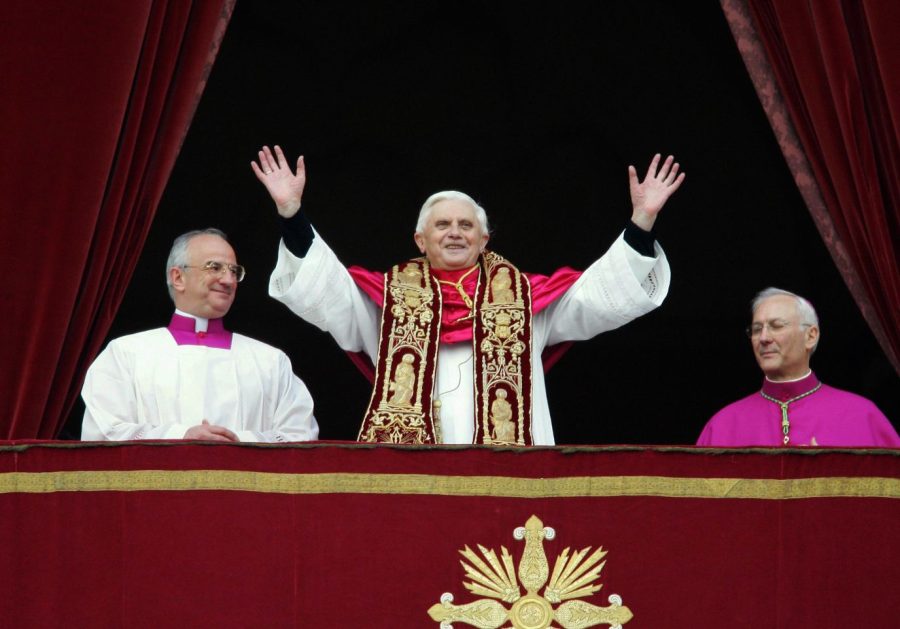Ex-Pope Benedict Emeritus Benedict XVI leaves behind a storied legacy
Pope Benedict XVI from the central balcony of St. Peters’ Basilica, 2005
At age 95, the head of the Holy Roman Church Pope Benedict XVI died on December 31, 2022 due to health complications.
As now-Pope Francis commented shortly after his death, many owe “gratitude to him, for all the good he did, and above all for his witness of faith and of prayer, especially in these last years of withdrawn life.”
Although he only served nine years as pope, Benedict XVI visited multiple countries, and improved relations with the Eastern Orthodox churches and Islamic institutions, historically groups apathetic to the Catholic church. He also enacted reform, allowing “greater use of latin mass” and approved that the assertion of “limbo” was restrictive, and thus unbaptized infants could be “saved”. In addition to being the first to transform Vatican City into having a zero carbon footprint, he also reformed the papal election process, making a two-thirds majority of the cardinal assemblies required for a pope to come to power. In 2008, he delivered an address to the United Nations, denouncing clerical sexual abuse and approved a decree allowing easier integration of Anglican clerics in joining the Holy Catholic Church. In a career which was rattled with scandals and conspiracies, he issued public apologies and organized committees to deal with future problems.
His position was not without controversy, of course. Notably, he was heavily criticized due to his lack of action in dealing with four major sexual abuse cases of minors in the late 1970s and early 1980s,while he was archbishop of the Church. During his time as pope, he was known for certain conservative mind views and policies, including smackdowns on liberal teachings on homosexuality, abortion, and the question of women priests.
In terms of his early life, Benedict XVI was born Joseph Ratzinger in Germany, April 16th, 1927. His youth was far from easy, with the Nazi Regime and harsh Roman Catholic Church exposing him to open hostility and violence at a young age. For both his theological education and early career from 1946-1951, he worked in Freising, Germany. From 1957-1969, he taught theology and dogma in schools in Freising, Bonn, Munster, Tubingen, and Regensberg. During this time he also served as chief religious advisor to the Archbishop of Cologne, Cardinal Josef Frings, before gaining the title of Archbishop himself in 1977. That same year, he became both bishop and cardinal at age 80. After becoming president of the Biblical Commission, Pontifical International Theological Commission, and Commission for Drafting the Catechism of the Catholic Church, he succeeded Pope John Paul II in April of 2005 to become the 265th pope of the Roman Catholic Church. In breaking 6 centuries of custom, Pope Benedict was the first pope to retire when he did so in 2013.
His funeral was held on January 5th, and Pope Benedict XVI currently lies in St. Peters Basilica. The United States Conference of Catholic Bishops and other Catholic leaders encourage Catholics around the world to practice prayers and mourning protocols for the pope. Now-Pope Francis publicly showed his remorse and gratitude to Benedict XVI, saying “only God knows the value and strength of his intercession, of his sacrifices offered for the good of the church”. Joe Biden – a Catholic himself – also commented how “Jill and [he joined] Catholics around the world, and so many others, in mourning the passing of Pope Emeritus Benedict XVI”. Even to this day, millions around the world still mourn for Benedict’s passing.
Despite whether he is perceived as a saint or “God’s Rottweiler”, his passing holds special significance in the Roman Catholic Sphere. Pope Francis comments, “we feel in the heart so much gratitude: gratitude to God for having given him to the Church and to the world.”


